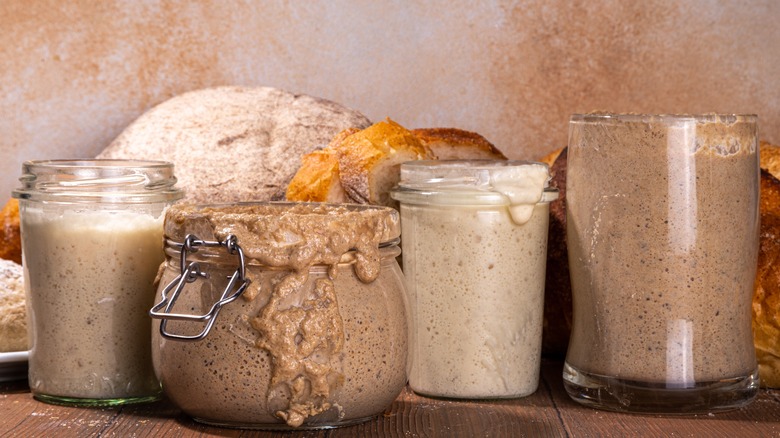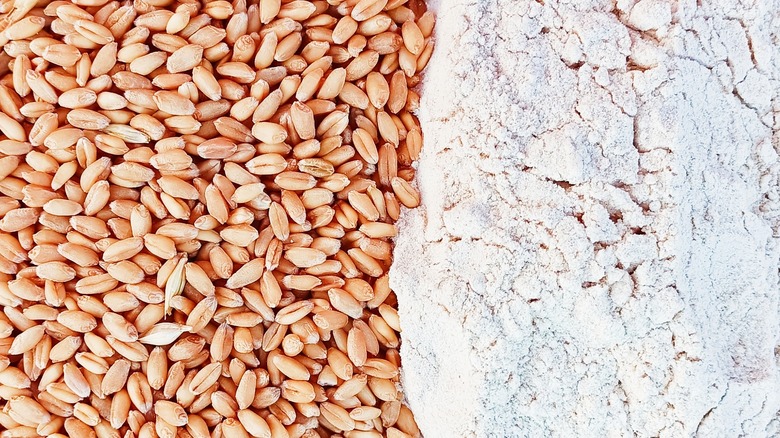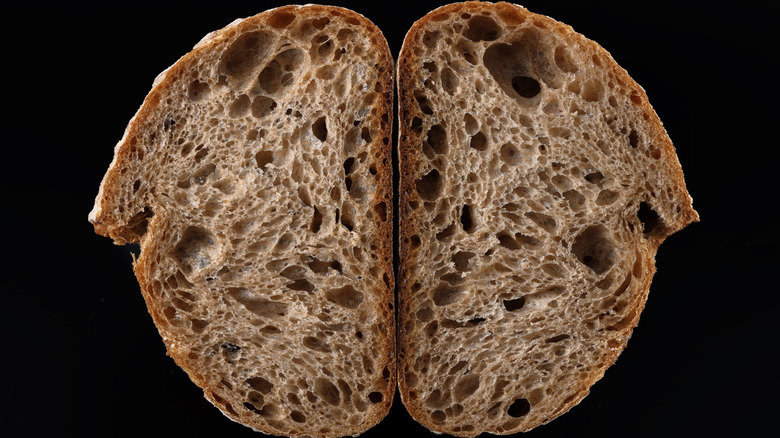What's The Best Flour To Use For Your Sourdough Starter?
A sourdough starter is a big commitment. It's basically an adult Tamagotchi toy that will inevitably consume more of your time and attention than you ever imagined. The commitment is more than worth it, though. Making your own sourdough bread allows for an almost unlimited degree of customization (plus, it'll have your house smelling like heaven all day). One of the easiest ways to customize your sourdough is by using different varieties of flour. This begs one question though: Is one type of flour better than the rest?
Flour serves as food for the yeast and bacteria that collect in a starter, and truthfully, any kind of wheat or rye flour will do the job. Yes, you can make a successful sourdough starter using basically any flour of your choosing, as long as it has enough gluten to trap air bubbles. That being said, different types of flour will cause slight variations in your starter, specifically regarding how long it takes to get a ripe sourdough, and what the final loaf will taste like. For the best results, the answer doesn't lie in a single type of flour, but rather in using a combination.
Why you should use two types of flour for sourdough starter
The most effective sourdough starters use a 50/50 blend of whole grain flour and white flour. To understand the difference between the two, we have to look at the structure of grains. A grain kernel has three parts. At the heart of the kernel is the germ, which is the seed of the plant. Surrounding the germ is the endosperm, a thick layer, mainly composed of carbohydrates, which serves as the plant's food supply. Lastly, there is the bran, which refers to the hard outer shell of the kernel.
Whole wheat flour includes all parts of the grain kernel. White flour, on the other hand, is only made from the endosperm. White flours include both all-purpose flour and bread flour, while whole grain flours include whole wheat as well as rye. Each variety has beneficial traits for sourdough. Whole grain flours contain more nutrients for yeast and bacteria, but white flours are better for forming a strong gluten network.
Using a mix of whole grain and white flours is especially important when you are just beginning your sourdough starter. Whole grains contain nutrients and enzymes that help to kick off the yeast development. Another way to help your starter grow and ripen quicker is to use rye flour for your whole grain portion. Rye contains a more diverse array of nutrients than wheat, so starters made with rye flour tend to mature faster.
How flour affects flavor
It could be argued that the biggest impact of your flour choice isn't about how quickly the starter matures or what the structure of your loaf is; it's more about flavor. The type of flour used has a huge impact on the flavor of a sourdough loaf. As a general rule, whole grain flours bring more flavor to the equation than white flours.
A sourdough starter made with only white flour will have a very mild taste. You'll find that a ripe white flour starter has a faint tangy scent. However, since there are no other strong flavors present, that tanginess will be the dominant force in your final loaf. It won't taste very sour, but it won't taste like much else either. On the other hand, a starter made from whole wheat alone will have a much stronger smell and a sharper sour flavor. In addition to more tanginess, whole wheat also brings some sweet, nutty, and malty notes that make for a more substantive flavor profile.
Rye is the most interesting choice of the bunch because its flavor is distinctly different from any type of wheat. If you enjoy a strong rye flavor, you should add it to your starter and your final loaf. However, if you'd prefer a milder rye flavor, you can use it in your starter, and use other flours for the final loaf. It takes some experimentation, but with persistence, you'll find the flour blend that's right for you.


